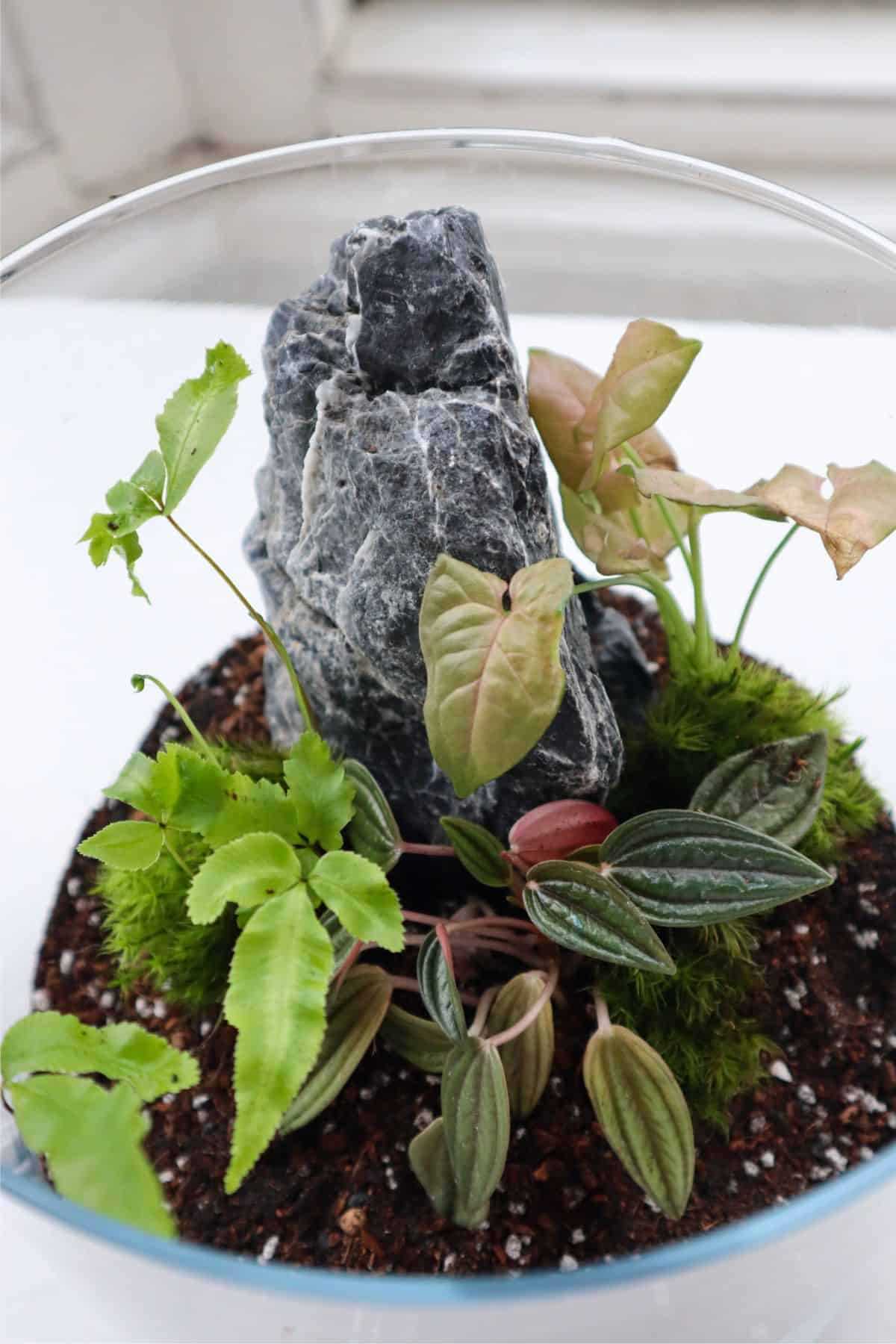
Lastly, think about the type of rocks that will best suit your terrarium theme. For a desert-themed terrarium, using rocks with warm earthy tones, such as sandstone or limestone, can create an authentic look. On the other hand, for a tropical or rainforest terrarium, opt for rocks with vibrant colors, like mossy rocks or river rocks. Consider also incorporating rocks with unique patterns or textures to add visual interest.
Terrarium Rocks: A Guide to Choosing the Perfect Rocks for Your Terrarium
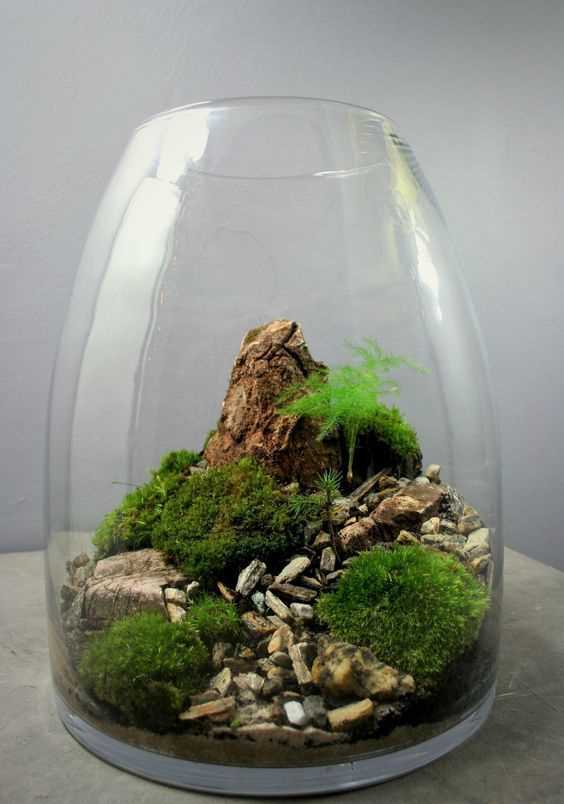
The Benefits of Using Rocks in Your Terrarium
1. Drainage: One of the primary benefits of using rocks in your terrarium is their ability to provide proper drainage. By layering rocks at the bottom of your terrarium, you create a reservoir for excess water to drain into. This helps prevent waterlogging and ensures that your plants’ roots are not constantly soaking in water.
2. Aeration: Rocks in a terrarium also aid in providing adequate airflow to the roots of your plants. They create air pockets that allow oxygen to reach the roots, promoting healthy plant growth.
3. Root Stability: Rocks can act as a stabilizing medium for plant roots. By layering rocks in the soil, you create a solid foundation that helps prevent the plants from tipping over or being uprooted easily.
Types of Rocks Ideal for Terrariums
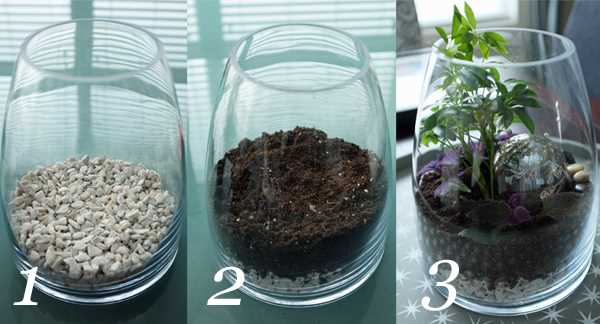
Not all rocks are suitable for terrariums. Here are some types of rocks that are ideal for terrariums:
1. River Rocks: These smooth, rounded rocks are perfect for terrariums due to their natural appearance and ability to provide good drainage.
2. Lava Rocks: Lava rocks are porous and lightweight, making them an excellent choice for terrariums. They retain moisture while allowing excess water to drain away.
3. Mossy Rocks: Rocks covered in moss add a beautiful and natural touch to your terrarium. They also provide a good environment for moss to grow and thrive.
Factors to Consider When Choosing Terrarium Rocks
When selecting rocks for your terrarium, keep the following factors in mind:
1. Size: Choose rocks that are proportionate to the size of your terrarium. Large rocks may overpower the plants, while small rocks may not provide adequate stability.
2. pH Level: Consider the pH level of the rocks, as certain types of rocks can affect the acidity or alkalinity of the soil in your terrarium.
3. Non-Toxicity: Ensure that the rocks you choose are non-toxic to plants and animals. Some rocks may release harmful substances when exposed to moisture.
Where to Buy Terrarium Rocks
There are several options for purchasing terrarium rocks:
1. Garden Centers: Many garden centers or nurseries offer a wide variety of rocks specifically for terrariums.
2. Online Retailers: Online retailers provide a convenient way to browse and purchase a diverse range of rocks for your terrarium.
3. Nature: You can also collect rocks from nature, such as from a river or a hike. Just ensure that you clean and sterilize them before adding them to your terrarium.
By carefully selecting the right rocks for your terrarium, you can create a visually appealing and thriving mini-ecosystem. Take the time to consider the benefits, types, and factors to ensure that your terrarium rocks contribute to the overall success of your terrarium.
Benefits of Using Rocks in Your Terrarium
Using rocks in your terrarium can provide a range of benefits that enhance the overall health and appearance of your miniature ecosystem. Whether you are creating a closed or open terrarium, rocks play a crucial role in maintaining a balanced environment.
1. Drainage and Moisture Regulation
One of the primary benefits of using rocks in a terrarium is their ability to improve drainage and regulate moisture levels. The rocks help prevent stagnant water from accumulating at the bottom of the terrarium, which can lead to root rot and other plant health issues.
The rocks create a space for excess water to drain, allowing the soil to remain moist but not waterlogged. This promotes healthy root growth and prevents the risk of suffocating the plants with too much water.
2. Aesthetically Pleasing Design
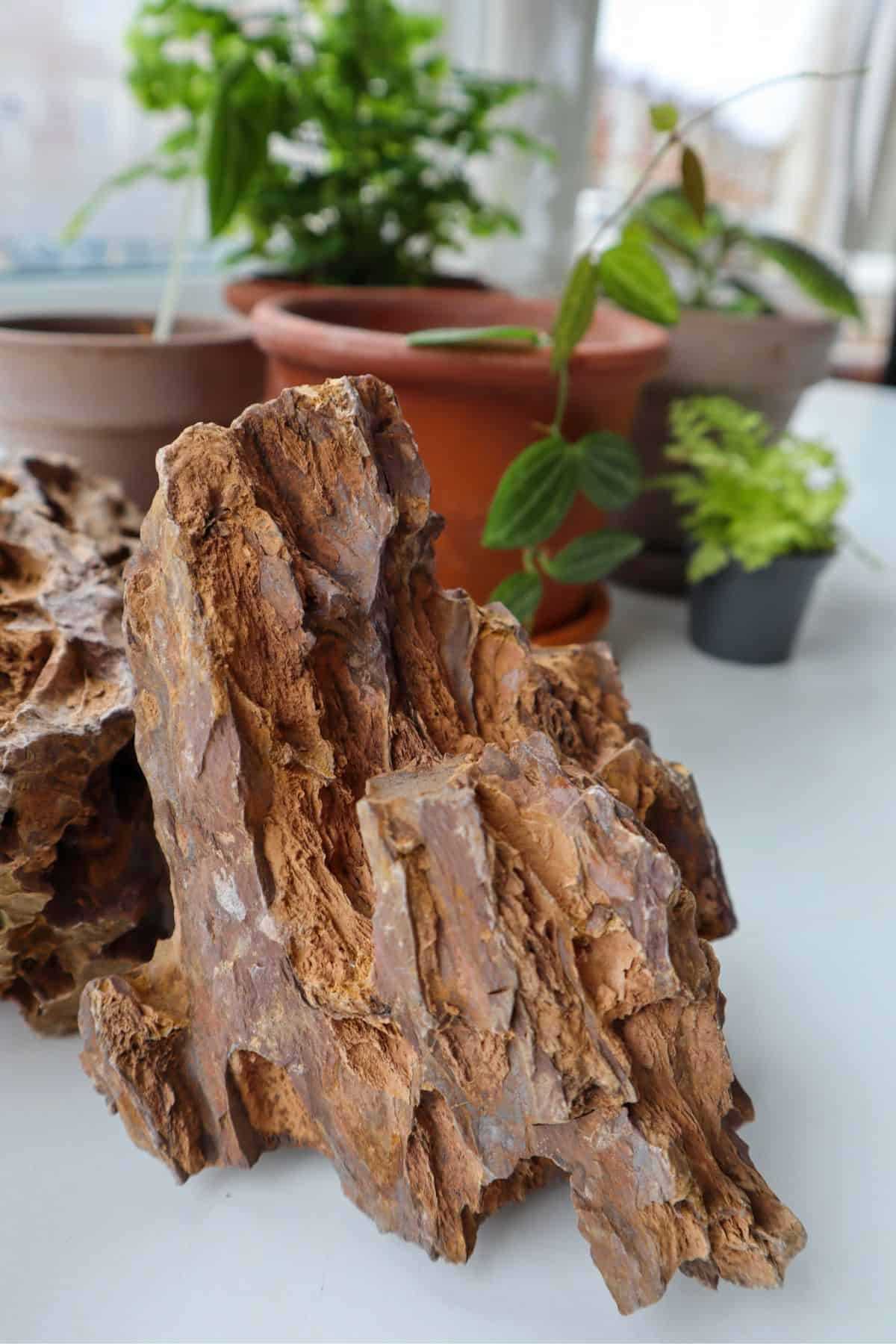
In addition to their functional advantages, rocks also contribute to the visual appeal of your terrarium. They add texture, dimension, and naturalistic beauty to the overall design. By choosing rocks of various sizes, shapes, and colors, you can create a visually striking and unique terrarium.
Consider using rocks with interesting patterns or colors that complement the plants and decorations in your terrarium. This will create a harmonious and visually pleasing arrangement that can be enjoyed as a miniature work of art.
3. Stability and Support
Rocks play a vital role in providing stability and support for your plants. They act as natural anchors for the roots, preventing the plants from toppling over or shifting in the soil. This is especially important for larger plants or those with top-heavy foliage.
By strategically placing rocks around the base of your plants, you can create a stable foundation that prevents them from becoming uprooted or damaged. This allows your terrarium to maintain its desired design and ensures the long-term health and well-being of your plants.
4. Natural Microhabitat Creation
Adding rocks to your terrarium can also help create natural microhabitats within the ecosystem. The crevices and spaces between the rocks provide hiding spots and shelter for small invertebrates, such as insects and springtails.
These tiny creatures contribute to the ecosystem’s overall balance by assisting in decomposition, nutrient recycling, and preventing the occurrence of pests. Rocks can help create a diverse and dynamic habitat that supports the overall health and stability of your terrarium.
Types of Rocks Ideal for Terrariums
1. River Rocks
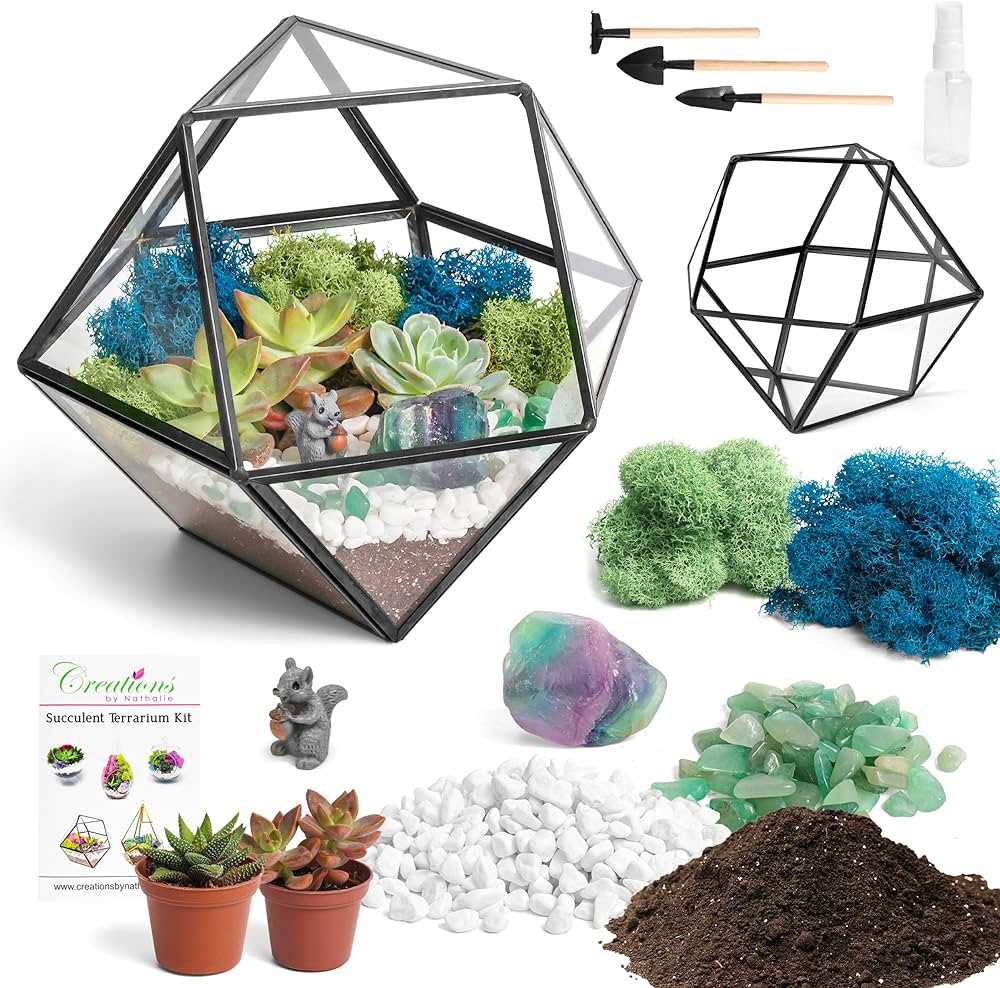
River rocks are smooth and rounded rocks that can add a natural touch to your terrarium. They come in various sizes and colors, allowing you to create different textures and patterns in your terrarium design. River rocks also help with drainage and prevent waterlogged soil, ensuring the health of your plants.
2. Gravel
Gravel is a versatile rock that can be used as a base or a top layer in your terrarium. It aids in drainage and prevents soil compaction, promoting healthy root growth for your plants. Gravel also adds visual interest and texture to your terrarium, especially when different colors or sizes are chosen.
3. Lava Rock
Lava rocks are lightweight and porous, making them ideal for terrariums. They provide excellent drainage and allow air to circulate around the roots of your plants. Lava rocks also have a unique texture and color, adding visual appeal to your terrarium.
4. Sandstone
Sandstone is a popular rock choice for terrariums due to its natural beauty and unique patterns. It is easy to shape and carve, allowing you to create custom designs and structures in your terrarium. Sandstone also provides good drainage and helps maintain a suitable moisture level for your plants.
5. Quartz
Factors to Consider When Choosing Terrarium Rocks
When selecting rocks for your terrarium, there are several important factors to consider. These factors will not only affect the aesthetics of your terrarium but also its functionality and long-term viability.
- Size: Consider the size of the rocks you choose. Larger rocks can be used as focal points or to create height variation within the terrarium. Smaller rocks can be used for lining the bottom or as decorative accents.
- Color: The color of the rocks can greatly impact the overall appearance of your terrarium. Choose rocks that complement the colors of your plants and other elements within the terrarium. Neutral tones such as gray, brown, or beige are versatile options.
- Porousness: Consider the porosity of the rocks. Porous rocks can absorb and release moisture, which can be beneficial for plants that prefer a more humid environment. However, if you have plants that require drier conditions, non-porous rocks may be more suitable.
- Compatibility: Ensure that the rocks you choose are compatible with the plants and other elements in your terrarium. Some rocks may alter the pH or mineral content of the soil, which can affect the health of your plants. Research the specific needs of your plants before selecting rocks.
By considering these factors when choosing terrarium rocks, you can create a visually appealing and well-functioning terrarium that will provide a suitable habitat for your plants and enhance your indoor space.
Where to Buy Terrarium Rocks
If you are planning to create a terrarium, finding the right rocks for your project is essential. Terrarium rocks not only add a beautiful aesthetic to your miniature garden but also provide drainage and support for your plants. So, where can you buy terrarium rocks?
| 1. Local Garden Centers: | Many local garden centers or nurseries carry a wide selection of rocks suitable for terrariums. Visit these stores and check their gardening section to find the rocks that best suit your terrarium needs. |
| 2. Online Retailers: | Shopping online offers convenience and a vast array of choices. Various online retailers specialize in selling rocks for terrariums. Simply search for “terrarium rocks” on your preferred search engine, and you will find numerous options to choose from. |
| 3. Landscaping Suppliers: | Landscaping suppliers often have a range of rocks available that can be suitable for terrariums. These suppliers typically offer a variety of sizes and types, allowing you to select rocks that fit your terrarium design. |
| 4. Rock and Mineral Shows: | If you enjoy exploring different types of rocks and getting hands-on, attending rock and mineral shows can be a great option. These shows often have vendors selling rocks specifically for terrariums, giving you the opportunity to select rocks in person. |
| 5. Natural Parks or Beaches: |
Whatever option you choose, ensure that the rocks you select are clean, free from harmful substances, and appropriate in size and shape for your terrarium. Remember to consider the needs of your plants and the overall design aesthetic when purchasing terrarium rocks.

I’m Lena Adams—a product of an unconventional upbringing in the African wilderness. My father, a daring explorer of African wildlife, sparked my fascination with reptiles, a passion that intertwined with the tragic loss of my mother during an expedition, leaving an indelible mark on my life. Driven to understand the creatures that captivated my parents, I embarked on my journey, sharing insights about reptiles, frogs, and lizards on my website. Through my explorations and conservation efforts, I honour my family’s legacy while seeking connections—to the creatures, nature, and the mother whose presence I yearn to understand.
